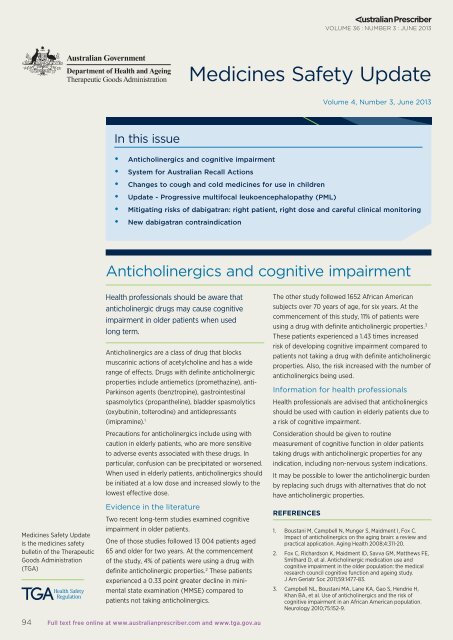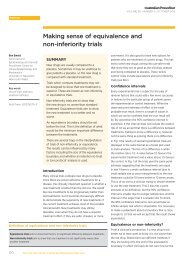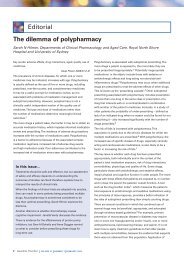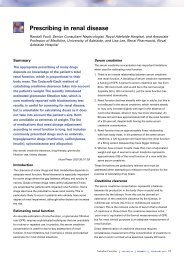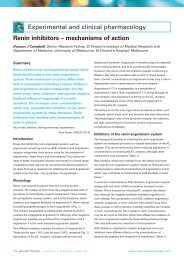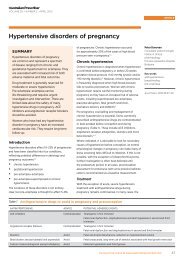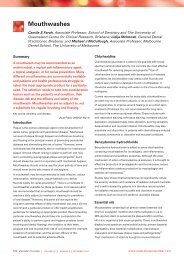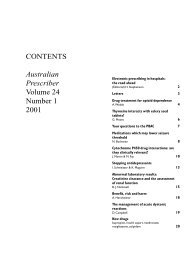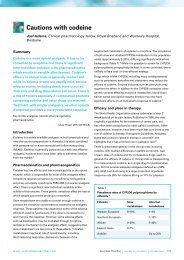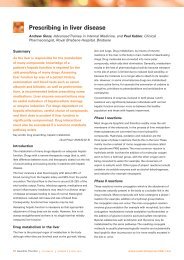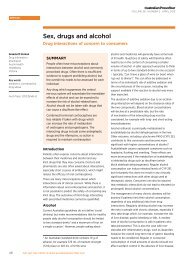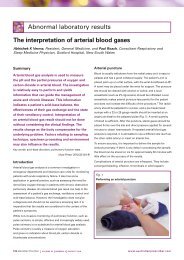download the full PDF issue - Australian Prescriber
download the full PDF issue - Australian Prescriber
download the full PDF issue - Australian Prescriber
Create successful ePaper yourself
Turn your PDF publications into a flip-book with our unique Google optimized e-Paper software.
VOLUME 36 : NUMBER 3 : JUNE 2013<br />
Medicines Safety Update<br />
Volume 4, Number 3, June 2013<br />
In this <strong>issue</strong><br />
••<br />
Anticholinergics and cognitive impairment<br />
••<br />
System for <strong>Australian</strong> Recall Actions<br />
•<br />
•<br />
•<br />
••<br />
New dabigatran contraindication<br />
• Changes to cough and cold medicines for use in children<br />
• Update - Progressive multifocal leukoencephalopathy (PML)<br />
• Mitigating risks of dabigatran: right patient, right dose and careful clinical monitoring<br />
Anticholinergics and cognitive impairment<br />
Medicines Safety Update<br />
is <strong>the</strong> medicines safety<br />
bulletin of <strong>the</strong> Therapeutic<br />
Goods Administration<br />
(TGA)<br />
Health professionals should be aware that<br />
anticholinergic drugs may cause cognitive<br />
impairment in older patients when used<br />
long term.<br />
Anticholinergics are a class of drug that blocks<br />
muscarinic actions of acetylcholine and has a wide<br />
range of effects. Drugs with definite anticholinergic<br />
properties include antiemetics (promethazine), anti-<br />
Parkinson agents (benztropine), gastrointestinal<br />
spasmolytics (propan<strong>the</strong>line), bladder spasmolytics<br />
(oxybutinin, tolterodine) and antidepressants<br />
(imipramine). 1<br />
Precautions for anticholinergics include using with<br />
caution in elderly patients, who are more sensitive<br />
to adverse events associated with <strong>the</strong>se drugs. In<br />
particular, confusion can be precipitated or worsened.<br />
When used in elderly patients, anticholinergics should<br />
be initiated at a low dose and increased slowly to <strong>the</strong><br />
lowest effective dose.<br />
Evidence in <strong>the</strong> literature<br />
Two recent long-term studies examined cognitive<br />
impairment in older patients.<br />
One of those studies followed 13 004 patients aged<br />
65 and older for two years. At <strong>the</strong> commencement<br />
of <strong>the</strong> study, 4% of patients were using a drug with<br />
definite anticholinergic properties. 2 These patients<br />
experienced a 0.33 point greater decline in minimental<br />
state examination (MMSE) compared to<br />
patients not taking anticholinergics.<br />
The o<strong>the</strong>r study followed 1652 African American<br />
subjects over 70 years of age, for six years. At <strong>the</strong><br />
commencement of this study, 11% of patients were<br />
using a drug with definite anticholinergic properties. 3<br />
These patients experienced a 1.43 times increased<br />
risk of developing cognitive impairment compared to<br />
patients not taking a drug with definite anticholinergic<br />
properties. Also, <strong>the</strong> risk increased with <strong>the</strong> number of<br />
anticholinergics being used.<br />
Information for health professionals<br />
Health professionals are advised that anticholinergics<br />
should be used with caution in elderly patients due to<br />
a risk of cognitive impairment.<br />
Consideration should be given to routine<br />
measurement of cognitive function in older patients<br />
taking drugs with anticholinergic properties for any<br />
indication, including non-nervous system indications.<br />
It may be possible to lower <strong>the</strong> anticholinergic burden<br />
by replacing such drugs with alternatives that do not<br />
have anticholinergic properties.<br />
REFERENCES<br />
1. Boustani M, Campbell N, Munger S, Maidment I, Fox C.<br />
Impact of anticholinergics on <strong>the</strong> aging brain: a review and<br />
practical application. Aging Health 2008;4:311-20.<br />
2. Fox C, Richardson K, Maidment ID, Savva GM, Mat<strong>the</strong>ws FE,<br />
Smithard D, et al. Anticholinergic medication use and<br />
cognitive impairment in <strong>the</strong> older population: <strong>the</strong> medical<br />
research council cognitive function and ageing study.<br />
J Am Geriatr Soc 2011;59:1477-83.<br />
3. Campbell NL, Boustani MA, Lane KA, Gao S, Hendrie H,<br />
Khan BA, et al. Use of anticholinergics and <strong>the</strong> risk of<br />
cognitive impairment in an African American population.<br />
Neurology 2010;75:152-9.<br />
94 Full text free online at www.australianprescriber.com and www.tga.gov.au


